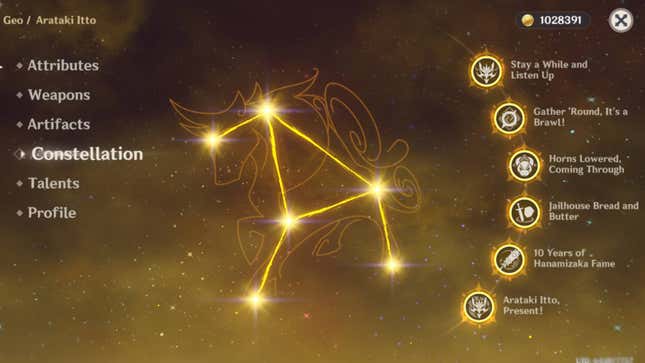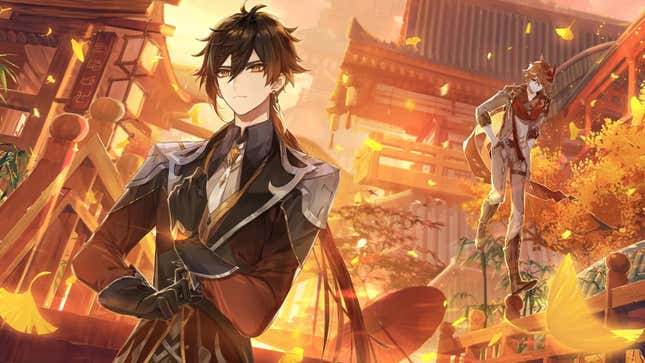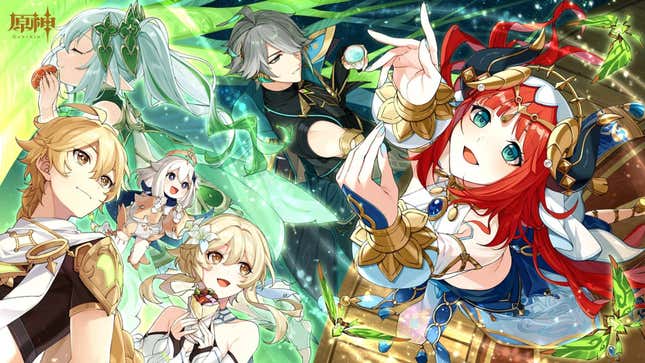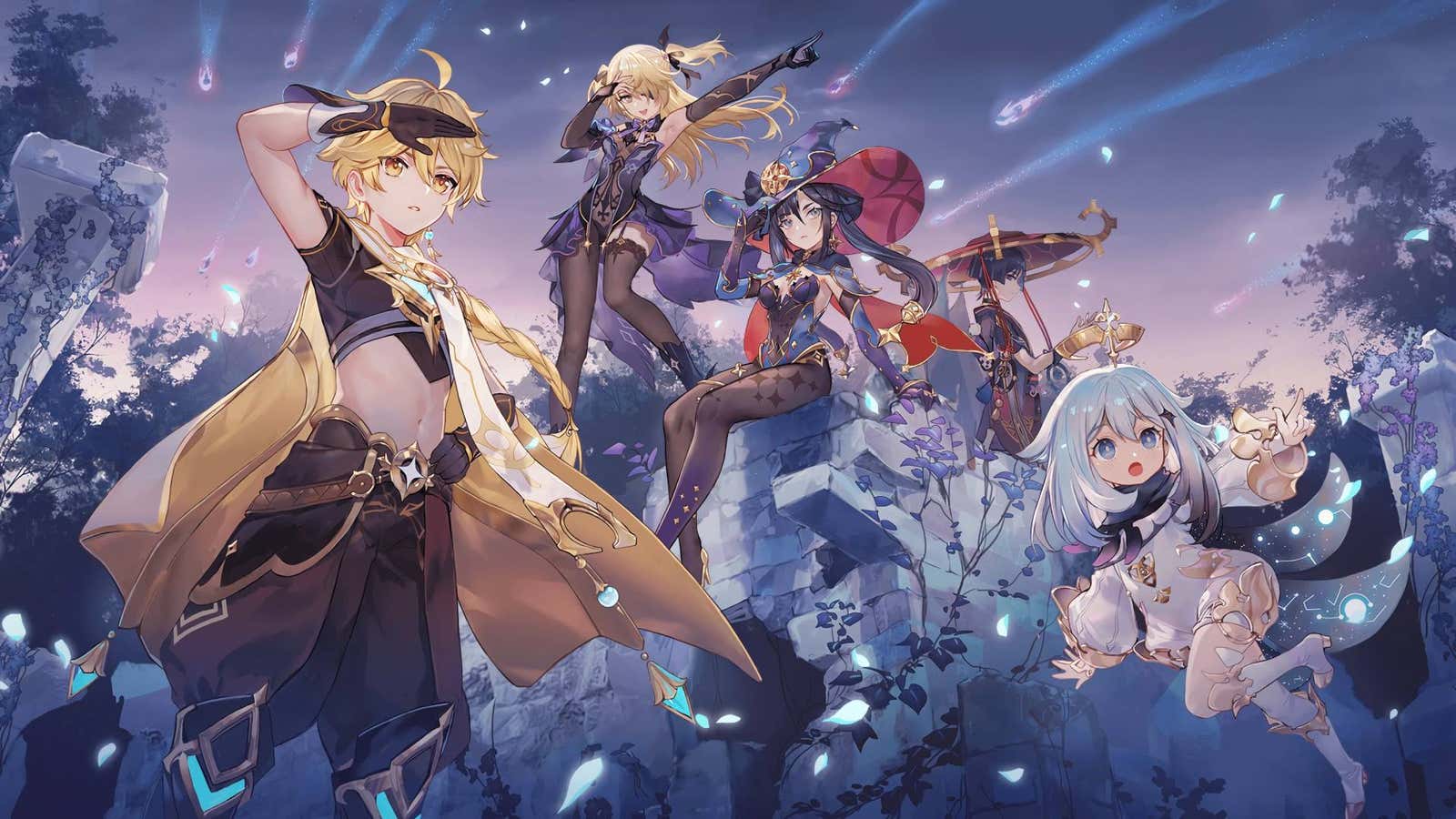“It’s like that Ariana Grande song: I see it, I like it, I want it, I got it,” said one anonymous investment banker who’s spent over $10,000 in the hugely popular, free-to-play action role-playing game Genshin Impact. “I’m not known for being cheap with what I like. Some people collect photocards. Some go to concerts and all sorts of things. I collect games.”
Whaling, the act of spending enormous amounts of money on digital games, can be a difficult topic to discuss in the gaming community. Free-to-play games often contain gambling systems designed to encourage spending, and the most prolific whales can make headlines for pouring thousands of dollars into acquiring playable anime characters. Especially in English-speaking communities, whales will often be discussed with a veneer of pity or scorn.
Most players I spoke to for this piece asked to be identified by their online names, and a few requested anonymity. Those who wanted to be anonymous cited concerns about being judged by their non-gamer peers, or of having their game account hacked.
“If my family and non-gamer friends ever knew, they would absolutely lose their minds,” said one government employee who spent over a thousand dollars on the game.
Here’s the napkin math
In Genshin Impact, constellations are ability boosts that you can only obtain by drawing multiple copies of a character from the randomized gacha. To verify that people had spent money in the game, I asked to see receipts or how many constellations they had in the game.
Assuming that you lose every pull where the chances of getting a character are less than 100%, it costs around $444 to guarantee a particular character through the game’s pity system, which increasingly stacks the percentages in your favor as you pull. If you’re going for a specific featured weapon, the figure is $592. A maxed constellation character is called a C6, and a maxed weapon is called R5. So a C6R5 is the most expensive character and weapon combination that you can have.

Not every whale goes that far, even for their favorite character. But if you want one, then you’ll have to set aside over $5,000.
Who are these so-called whales?
Some of these whales are long-term gacha players who are used to spending considerable amounts of money in pursuit of characters that they wanted. I spoke to players who worked in government, transportation, legal, food service, and retail. Those who were not wealthy told Kotaku that they still lived with their families.
Since it typically requires a lot of money to be able to spend thousands of dollars on a video game, the higher-end whales I spoke to had well-paying occupations. These whales worked in IT, mergers and acquisitions, software, accounting, investment banking, and cybersecurity. “Genshin’s whaling audience is primarily adults with enough income coming in to support their hobbies,” said Moss, an 18-year-old restaurant worker who currently attends college. They’ve spent $3,000 on the game since it launched in 2020.
“[Whales] are people who spend money in [Genshin] because it’s a lesser vice,” said an anonymous player who spent $8,000. “People in whale communities usually have more than one place [where] they invest their money.”
Dolphins are gacha players who are willing to spend significant amounts of money, but are considered a step below the fabled whale. I received responses from players who “only” spent around $1,000 after saving for over a year, and did not feel that they qualified as whales. Meanwhile, others identified as whales after barely hitting a single grand. There is no established, hard and fast dollar amount that defines “whaling.” Ultimately, these stories are about how big spenders perceive money differently from those who don’t buy premium currency in Genshin.
Are these whales in financial distress?
The report is limited to high spenders who were willing to speak to a reporter, despite the stigma against microtransaction spending. Within those constraints, no one I spoke to was in serious financial trouble, which means that they are more likely to have a neutral or positive view of the microtransaction system. A few admitted that they scaled back their spending because it was negatively affecting their bank account. Others were aiming to maximize their favorite character’s abilities and weaponry, but didn’t plan to whale beyond that. Except for the players who wanted to pull every single character, all of the whales I spoke to would plan ahead, not spending anything until those times when a character they really wanted actually became available, often waiting months for those windows of opportunity to arise. A few told me that they used leaks to plan ahead.
“[Rolling for every Inazuma region character] didn’t cause me financial hardship, but it probably would have if I had continued,” said Jay, who had spent over $16,000. “I decided I’d be a lot pickier about characters I want to get constellations for going forward, which has helped me keep my spending this year much lower.”
Why do they whale if the game can be played for free?
Some players were very calculated about their spending. Others were simply accustomed to paying top dollar for the things they wanted. As a self-identified introvert, one high-spender felt that Genshin fit their gaming preferences better than other live service games. “MMORPGs such as [Final Fantasy XIV] force me to work with other people to get anything done in-game… I just want to be able to enjoy playing on my own with a [fully maxed Genshin character] in peace, you know?” they said.
Whaling was especially prevalent among Genshin players who didn’t play any other games, lived in geographically isolated areas, or didn’t have other expensive hobbies. “Video games are probably the biggest recreational investment in my life,” said QQ, a player who had spent over $1,000 in total. “The money going to Genshin and other games would have been spent elsewhere regardless of what my hobbies were at the time.”
“One [reason] is pushing out as much damage as I can from these characters, and testing different [team] comps and strategies. And two, it’s a completion thing. Having everyone maxed out just looks visually appealing,” RazerNinjas told Kotaku over a Zoom call. He spent $90,000 on Genshin, which he also streams in addition to working a full-time job. “The third is the streaming part. There’s always someone who wants to see what’s the max power level of this character?” I asked if having an audience pressured him to spend. He said that maxing every character was “something I just do anyway.”
RazerNinjas is an extreme outlier among self-identified Genshin whales. Unless a player is well-off, there’s a statistical limit to how many characters and weapons that they can pull from the gacha. For some Genshin players who don’t have such resources, decisions about how to spend their limited funds are influenced by the gameplay meta—constantly evolving ideas the playerbase has about how to create a team that’s exceptionally well-suited to tackle the game’s challenges. But for those who don’t chase the meta, character design and storytelling are bigger factors than high damage potential.
“I took [Zhongli] to C6 because I loved him. As a Chinese American, I thought he symbolized our culture and who I knew myself to be,” said one anonymous player who works in entertainment and spent $6,000 on Genshin. “But everyone else, if I liked a character like Hu Tao or Childe, I would spend a little on them. ”

In October 2020, HoYoverse’s co-founder Liu Wei told the press that Genshin was aimed at “otaku” players. This demographic, he said, would “pay for love,” rather than gameplay advantages. Although he was talking about the Chinese gaming market, some players in western countries have also come around to shelling out big bucks just because a character really appeals to them.
“[HoYoverse] understands the amount of commitment and dedication people have in the anime and manga culture in East Asia,” said the Zhongli player. “Maybe they didn’t intend for it to happen in the west, but they definitely understand it in East Asia.”
Do they regret whaling?
“I do have mental health issues, and sadly I’ve discovered that the money I’ve spent on Genshin is still cheaper than full-time private therapy around here. I’ve been using the game as a type of emotional crutch keeping me together,” said one anonymous government employee who spent over $1,000. “I know it’s not healthy, but I love the game so much. I look forward to it every day.”
Still, some players felt conflicted about purchasing such expensive digital goods. “I could have used that money for something else,” said Patrice, a college student who had spent “maybe” $2,000 or $3,000 before quitting to focus on her studies. “I would think: Wow, I spent [over $1,000] on C6 of a character when I could have bought a whole new laptop, clothes, or food.” Those who continued to spend were cutting back elsewhere in their lives. “I’ve let go of some impulse buying or personal wants because all I keep thinking is ‘buying this is equivalent to [x] pulls,’” said the government worker.
“I do remember being a bit stingier on things I’d usually buy for myself [like] clothes, figures, [and] bubble tea,” said Kaz, a retail employee who had spent around $9,000. But shaving off smaller expenses didn’t negate the total amount that they spent over time. “With the amount of money I had spent, I thought about what I could’ve got instead.” They’re a little more conservative with which characters to spend on now, but they were “happy to contribute to a game I enjoy playing, and I don’t regret spending a dime.”
For those working high-paying jobs, the top spenders were unreservedly satisfied with their purchases. “I bought the best that I could afford and I’m satisfied with that. I also don’t feel remorseful because I get to log in every day and play with C6R5 Tartaglia,” Jay wrote.
However, Genshin has had problems with account security, which can be a huge issue for players who have spent thousands of dollars. In December 2020, hundreds of accounts were hacked due to security flaws in the game. This April, QQ had a scare when her bank payment bounced, but she had already “rolled” the digital currency. HoYoverse threatened to permanently ban her account unless she came up with the payment. QQ eventually resolved the situation, but her view of Genshin had changed. “That ordeal shocked me to my core, and I’ve been more reluctant about spending since,” she said.
Another player who spent $8,000 closely followed the gameplay meta, and did feel some regret about some earlier, less informed pulls. But they took things in stride when the value of their investment dropped. “Meta changes, and characters falling out of usage is to be expected.”
Do they think that gacha is predatory?
Around half of my interviewees said they believe that gacha is a “predatory” system, or described it as gambling. The other half, particularly those who work in high-income jobs, think that it’s fine to let people spend however much they like. Every high-spender said that players should spend within their means, and pull out of the game if they’re facing financial problems.
“Too many people chase the dopamine rush of getting the unit they want, or get swept up in the hype,” said J, a legal assistant who had spent over $2,000. “It’s not worth it. They’re just pixels.”
“In the end, it’s really just a gambling addiction,” said Lansze, an IT professional who has spent $5,000. “I do spend more than I would like to sometimes because I haven’t got everything that I would like.” He had negative feelings about the monetization system on a macro level, but: “I personally don’t have any problem spending on [Genshin] because I just see it as supporting the developer. They’re doing something really unique.”
Kejoca enjoys “gambling” in Genshin, but she worries about younger fans who don’t make the same amount of money that she does. When she sees an artist open up art commissions to get a specific Genshin character, she occasionally buys art for the amount that they would need to “guarantee” that character. “Unless you’re okay with not spending money and being okay with not getting everything you want, don’t play it,” she would tell prospective players. “Because you will get sucked into it.”
“It’s one thing to sell cosmetics in game to generate revenue for continued development of a game, but gacha is incredibly predatory and the cost of being addicted is huge, possibly life-ruining,” Jay told me over Twitter DMs. “I’d honestly love for the conversation to continue, and for more regulations on gacha or blind lootboxes to be put in place to protect people who are susceptible to being taken advantage of in this manner.”
One programmer named Lunikc spent $25,000 on the game, but felt relaxed about the monetization system because players don’t need to spend in order to clear endgame content. “There is no PvP, so [there’s] no real pressure to compete. It’s only co-op, [so] I think it promotes a better gaming community and environment.”
Solian_13 works as a developer in the video game industry, and he used to make free-to-play games. His “soul-sucking” experiences working in the mobile industry informed his own perspective on Genshin. “I think gacha games have less monetization... or like, top-down stuff. Because it’s separated from the gameplay. You’re making a good game, and then gacha is the monetization. Whereas for a [free-to-play strategy] game like Clash of Clans, monetization is the core thing, and you pay for time.” However, he acknowledged that the game still involved gambling. “I think it deserves to be criticized. Or at least looked at critically.”
Some high spenders even felt that their relationships to these companies were symbiotic. They felt that they were contributing to the long-term success of the game, since they’d paid more than the standard price of a retail game. When the official anime was announced, several players joked that their whaling had helped fund the production.
“If people are creating good games out of [microtransactions], then I am going to invest my personal finances to support it,” said the anonymous player who had spent $6,000. “I feel like the general consensus is that Genshin is more acceptable, because [HoYoverse] did create something very unique and unprecedented.” She pointed out that Genshin has tons of lore, complex character designs, and intensive voice acting. “There’s a genuine effort invested into creating this game, setting a precedent. I think the concern is that there are many games that just try to take advantage of the [microtransaction] methodology, but not the practice of creating a rich game.”
Do their friends know about their high spending?
While some self-identified whales were open to their friends about spending thousands of dollars on Genshin, most of the interviewees were hesitant if not completely unwilling to inform their friends and family. Most people cited social embarrassment as the main reason why they wouldn’t tell their close confidantes.
“I’m already embarrassed to tell my friends [who play Genshin],” said Patrice. “Telling non-gamers is out of the picture”
A lack of education about microtransactions also prevented high spenders from telling others about their main hobby. “My closest friend still calls me a ‘whale’ to this day — a term she didn’t even know before I had enlightened her — because she’d heard that I’d spent hundreds on Genshin at the time. [She] has no idea how much that amount has increased since,” QQ told me over Twitter DMs. “And I don’t plan on telling her.”
Lansze simply didn’t think there was a point in telling people who didn’t understand whaling. “I wouldn’t tell my mom that I spend this much money on gacha games when I call her every week,” he said over a video call. “To non-gamers, I think the idea of spending on games in general is already pretty nonsensical.”
Not everyone had a negative experience, however. Jay refrained from telling her non-gamer friends, but she had a community of supportive Genshin players. “My Genshin Impact friends were all very supportive of my decision to spend on the game, and they’ve also been very supportive of the new ‘low spender’ me,” she said. “At first, there was some pressure to keep spending a lot because everyone was having fun with my ‘whale antics,’ but now the attitude about it has changed a lot. They encourage me to save and only spend a lot on characters I really love.”

Several high spenders were embedded in Asian communities for Genshin, which they felt were more accepting of whaling. “My experiences in a[n Asian] whale community are far more positive than the interactions I’ve had with America-based communities,” said Ely, who worked in IT. She has spent $8,000 since the game’s launch year. “Whales are still people, and it saddens me to think of when I got bullied in environments which feed into a ‘whales are wasting money’ mindset.”
For as long as I’ve been writing about Genshin for Kotaku, I’ve been an advocate for increased government regulation on gacha. “Minors should not be allowed to purchase microtransactions” and “companies should publish data about their incredibly lucrative business practices” are reasonable baselines that should not garner any sort of controversy. But experts say that regulating gacha and loot boxes is much more complicated than simply issuing a ban on all games that contain loot boxes. I spoke to Dr. Darshana Jayemanne, a researcher at Abertay University. This summer, he contributed research to a British government-funded study about loot boxes.
“There’s a lot of stakes in trying to get this right,” Jayemanne told Kotaku over a Zoom call. “Loot boxes seem to be an area where it’s an opportunity to think about how you would have oversight and [having] resources available for populations that may be harmed by them.” However, he said that these gaming companies currently do not have a lot of external incentive to provide researchers with disaggregated data. However, Jayemanne hopes that companies will voluntarily provide researchers with data in order to find a middle-ground approach to navigating regulation.
Even when governments do regulate gacha and loot boxes, companies don’t necessarily follow the law. I spoke with Leon Xiao, a researcher from the University of Copenhagen, over Zoom, and he told me that legal compliance varied across different countries, which have tried very different approaches to regulation. Laws on luck-based microtransactions are incredibly successful in China, where 96% of games comply with a requirement that they disclose the probabilities of getting a certain reward to players. In contrast, Belgium had much less success with its own approach, implementing some of the most stringent bans in the world on video game gambling. Xiao traveled to Belgium and discovered that 82% of the highest-grossing games on the App Store still had microtransactions.
“The problem was that the Belgian gambling regulator was so underfunded that it did not have the ability to go after these companies,” said Xiao. “Even though they’re technically breaking the law.”
Since underfunded governments are a persistent reality in our neoliberal hellscape, governments such as Japan and the UK have turned to industry-led regulation. “If you think about this on a practical level, there are 1 million games on iOS alone, and then we expect a lot of these games to get regular updates,” said Xiao, painting a picture of an industry that would require tremendous resources to keep up with and regulate effectively.
At least other countries are talking about it. Consumer protections in the U.S. are a complete joke, and there isn’t a concerted effort to regulate microtransactions (the last bill was introduced to Congress in 2019, and it seems to have died there). Right now, the best protection that Genshin players have is a community that looks out for them. None of the whales I spoke to wanted players to spend beyond their means, and some of them even took measures to ensure that others didn’t feel like they were missing out.
But with the exception of content creators, whales are largely an invisible group. They face social stigma from both people in their day-to-day lives and the Genshin community at large. As I interviewed some of these people who spent thousands of dollars on the game, I worried about less affluent players who felt too ashamed to tell their families. Who would they turn to if they started whaling beyond their means?
The answer should be “all of us.” Whaling should be an activity that players can discuss openly without fear of being shamed or ostracized from their communities. Many high-spenders have found supportive social networks within Genshin’s large player base, but empathy and support should be available to everyone. Even the people who spend $5,000 on anime characters.
